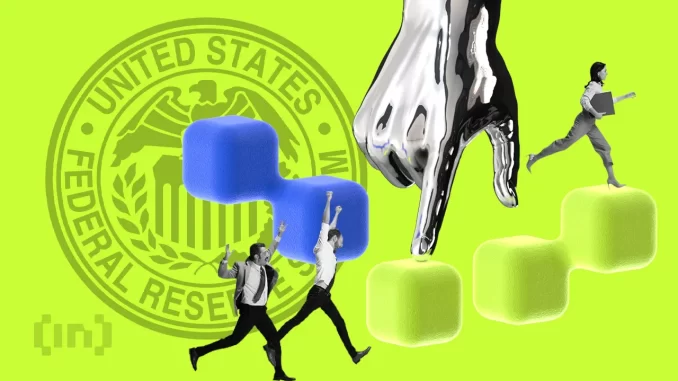
Federal Reserve Chair Jerome Powell has indicated that interest rate cuts may be further off than anticipated. He cites recent inflation data that defies earlier expectations of a rapid decline.
The decision signals a potential shift in the Fed’s approach. It will also potentially reopen the debate about Bitcoin’s effectiveness as an inflation hedge.
Is Bitcoin Still a Safeguard Against Inflation?
Powell acknowledged that despite initial progress, inflation rates have yet to show sustained improvement towards the Fed’s 2% target.
“The recent data have clearly not given us greater confidence … Given the strength of the labor market and progress on inflation so far, it is appropriate to allow restrictive policy further time to work and let the data and the evolving outlook guide us,” he said.
If inflation continues unchecked, Powell stated the Fed’s willingness to hold rates steady “as long as needed.”
His comments, made alongside Bank of Canada Governor Tiff Macklem, imply that the Fed sees little urgency in cutting rates soon. This marks a departure from earlier expectations and suggests a reduction may only come later in 2024.
Read more: How to Protect Yourself From Inflation Using Cryptocurrency
This shift in messaging comes after several months of inflation readings above analysts’ forecasts. It indicates the Fed’s reluctance to cut rates prematurely, suggesting that potential reductions in 2024 might occur late in the year or not at all.
Investors and economists alike are adjusting their expectations. While Fed policymakers recently signaled three interest rate cuts, market futures now reflect predictions of only one or two cuts this year. The Federal Open Market Committee’s next meeting on April 30 – May 1, 2024, will offer additional clarity.
The potential for continued high interest rates raises concerns about economic growth. It also raises questions about the trajectory of asset prices like Bitcoin (BTC).
Bitcoin, often touted as a hedge against inflation, has faced renewed scrutiny in light of the Fed’s remarks. Its recent volatility and sensitivity to global factors complicate its position as a reliable inflation shield.
Skybridge founder Anthony Scaramucci addressed the question. He argues that Bitcoin’s current volatility is expected for an asset with relatively low global adoption.
“It will be both [an inflation hedge and store of value] as it scales… it is, however volatile,” Scaramucci stated.
He stressed that Bitcoin’s performance should be viewed in the context of its developmental trajectory rather than current fluctuations alone.
Separately, Yat Siu, founder of Animoca Brands, adds a new perspective. He envisions Bitcoin’s future value proposition. It hinges on its role as a status symbol within the digital economy rather than simply a store of value.
“Bitcoin could reach over a million dollars at some point … not because it is a store of value, but because it will become one of the most important status symbols of the digital economy in the future,” Siu remarked during a panel at WebSummit Rio.
Institutional Interest Grows, But Will Hong Kong ETFs Boost BTC?
Bitcoin’s increasing institutional appeal is undeniable, with the approval of spot Bitcoin exchange-traded funds (ETFs) in the US driving recent price surges. Moreover, the recent addition of Hong Kong-based spot Bitcoin and Ethereum ETFs has sparked discussion about their potential impact on the market.
However, opinions are divided on the immediate impact of Hong Kong’s ETFs.
Senior ETF analyst at Bloomberg Intelligence, Eric Balchunas, expresses tempered expectations for the Hong Kong ETFs. He highlights factors such as the Hong Kong market’s small size, lack of mainland Chinese participation, and less efficient trading infrastructure as potential limiting factors.
“The underlying ecosystem there is less liquid and efficient, which could affect the performance of these ETFs,” he said.
Nonetheless, Balchunas acknowledged that “other countries adding BTC ETFs is no doubt additive” for Bitcoin in the long term.
Markus Thielen, founder of 10X Research, adds that cultural preferences for direct investments within the region could limit the impact of Hong Kong ETFs compared to US ones.
“ETFs generally see limited success in Asia where investors prefer direct, concentrated bets. However, since these ETFs represent a single asset, their uptake could potentially be more favorable,” he explained.
Read more: How To Trade a Bitcoin ETF: A Step-by-Step Approach
Despite the mixed outlook around Hong Kong’s Bitcoin ETFs, many analysts view the approval as a positive development. Notably, Anthony Pompliano sees this regulatory move as a potential signal that China could soften its stance on Bitcoin, opening avenues for adoption among its vast population.
At the time of writing, Bitcoin trades at $64,000, holding steady after recovering from a recent dip caused by geopolitical tensions between Israel and Iran.
The Fed’s policy shift and the ongoing debate about Bitcoin’s inflation hedge capabilities will remain key factors influencing the cryptocurrency market in the coming months.
Disclaimer
In adherence to the Trust Project guidelines, BeInCrypto is committed to unbiased, transparent reporting. This news article aims to provide accurate, timely information. However, readers are advised to verify facts independently and consult with a professional before making any decisions based on this content. Please note that our Terms and Conditions, Privacy Policy, and Disclaimers have been updated.





Be the first to comment